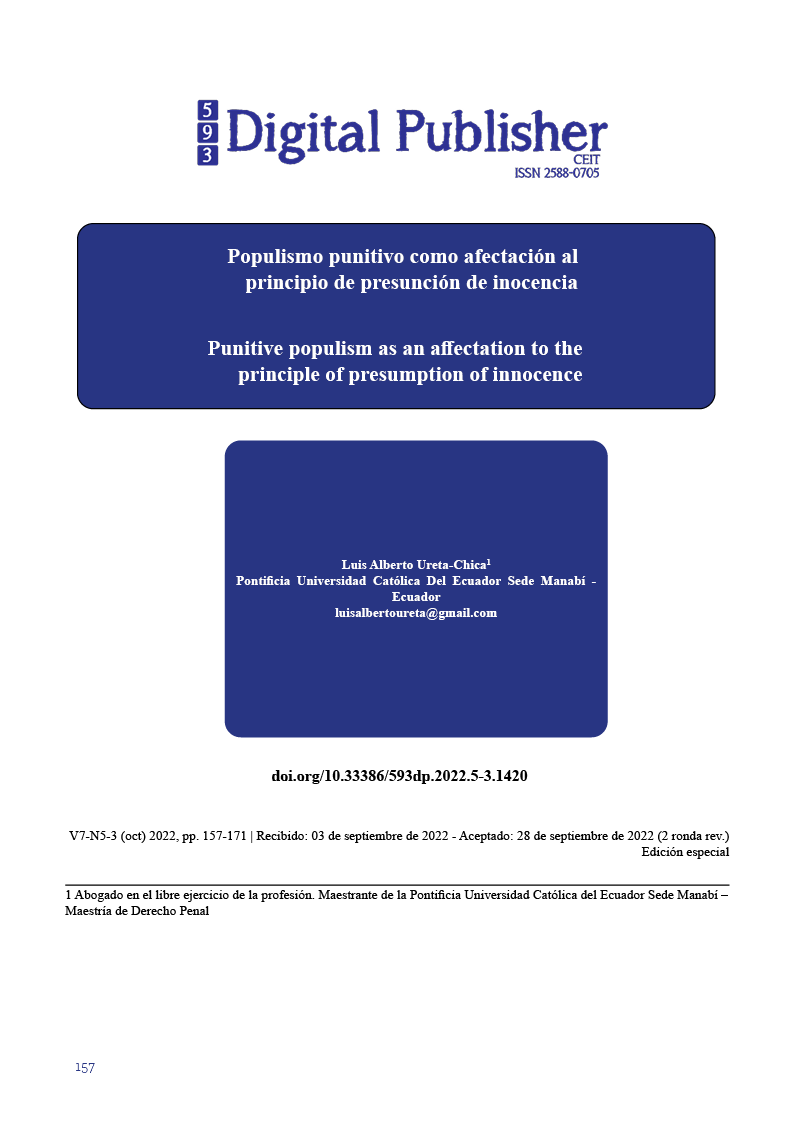Punitive populism as an affectation to the principle of presumption of innocence
Main Article Content
Abstract
The proposed article falls within the presumption of innocence as a probative rule, which translates into the requirements that the evidentiary activity must meet and the characteristics that each of the means of evidence provided by the State Attorney General's Office must meet. ted in order to consider that there is valid evidence of charge.
The proof of charge is that aimed at directly or indirectly accrediting the relevant facts in a criminal proceeding, either regarding the existence of the crime and/or the criminal responsibility of the accused. Emphasis is also placed on opinion journalism, investigative journalism, the power of public opinion and the media coverage of judgments of social or political importance that have constituted an epicenter of pressure.
Based on the above, the right to information goes hand in hand with the presumption of innocence, where with the evidence that is going to contradict in the process, they will have to undermine said right so that the judges can sanction it, if it were the case, otherwise they will have to confirm their innocence.
It is necessary to make it clear that the state of innocence is destroyed but it should not be demonstrated, since, as it is a basic guarantee of due process, we cannot allow it to be violated when deciding on the person who is being prosecuted. Thus, when an investigation is initiated, this right cannot be evaded, since another guarantee, which is due process, would be interrupted.
Downloads
Article Details

This work is licensed under a Creative Commons Attribution-NonCommercial-ShareAlike 4.0 International License.
1. Derechos de autor
Las obras que se publican en 593 Digital Publisher CEIT están sujetas a los siguientes términos:
1.1. 593 Digital Publisher CEIT, conserva los derechos patrimoniales (copyright) de las obras publicadas, favorece y permite la reutilización de las mismas bajo la licencia Licencia Creative Commons 4.0 de Reconocimiento-NoComercial-CompartirIgual 4.0, por lo cual se pueden copiar, usar, difundir, transmitir y exponer públicamente, siempre que:
1.1.a. Se cite la autoría y fuente original de su publicación (revista, editorial, URL).
1.1.b. No se usen para fines comerciales u onerosos.
1.1.c. Se mencione la existencia y especificaciones de esta licencia de uso.
References
ACADEMO. (2017). Revista de Investigación en Ciencias Sociales y Humanidades, Vol. 4 Nro. 1.
Asamblea General OEA. (10 de junio de 2003). Resolución 1935 (XXXIII-O/03). Acceso a la Información Pública: Fortalecimiento de la Democracia.
Bueno Ochoa, L. (2009). Independencia Judicial y Medios de Comunicación. En M. Grande Yáñez (Coord.). Independencia Judicial: Problemática Ética. (pp. 135-158). Madrid: Dykinson.
Carnelutti, F. (2007). Cómo se hace un proceso. Bogotá: Temis.
Carrillo, M. R. (2012). El impacto de Internet y las redes sociales en el derecho a la libertad de expresión. FRONESIS Revista de Filosofía Jurídica, Social y Política, Vol. 19, No. 3, 2012: 331 - 349 - Universidad Católica del Táchira Táchira-Venezuela.
Chúa, L. M. (2017). Presunción de inocencia e inocencia de la presunción.
Código Orgánico Integral Penal [COIP]. (2014). art 453 - Registro Oficial N°180. 10 de febrero 2014: Ecuador.
Código Orgánico Integral Penal [COIP]. (2014). art 562 - Registro Oficial N°180. 10 de febrero 2014: Ecuador.
Código Orgánico Integral Penal [COIP]. (2014). art. 529.1 - Registro Oficial N°180. 10 de febrero 2014: Ecuador.
Comisión Interamericana de Derechos Humanos. (2012). El derecho de acceso a la informacion en el marco Juridico Interamericano. Segunda Edición, Relatoría Especial para la Liberad de Expresión. Obtenido de http://www.cidh.org/relatoria
Constitución de la República del Ecuador. (2008). Registro Oficial 449 de 20 de octubre de 2008: Reformas en el Registro Oficial – Suplemento de 25 de enero de 2021.
Constitución de la República del Ecuador. (2008). Art.76, Registro Oficial 449 de 20 de octubre de 2008: Reformas en el Registro Oficial – Suplemento de 25 de enero de 2021.
Constitución de la República del Ecuador. (2008). Registro Oficial 449 de 20 de octubre de 2008.
Corte Constitucional del Ecuador. (2016). Desarrollo jurisprudencial de la primera Corte Constitucional (Periodo noviembre de 2012 – noviembre de 2015 (Vol. Jurisprudencia constitucional Nº. 7). Quito: ISBN: 978-9942-22-077-6.
Corte Constitucional del Ecuador. (12 de agosto de 2020). Sentencia No. 14-19-CN/20. Juez ponente: Agustín Grijalva Jiménez.
Corte Constitucional del Ecuador. (02 de junio de 2021). Sentencia No. 14-15-CN/19, párr. 18. Jueza ponente: Teresa Nuques Martínez .
Corte Interamericana de Derechos Humanos. (18 de agosto de 2000). Cantoral Benavides Vs. Perú - Serie C No. 40, Serie C No. 69, Serie C No. 88, Párrafo 120.
Corte Interamericana de Derechos Humanos. (5 de octubre de 2015). Sentencia Serie C No. 302, párr.197. Caso López Lone y Otros vs. Honduras.
Corte, C. ((Periodo noviembre de 2012 - noviembre de 2015), pág. 33). Desarrollo jurisprudencial de la primera Corte Constitucional.
Ferrajoli, L. (1995). Derecho y Razón, Teoría del garantismo penal. Trotta.
Moreno. (2015). El falso testimonio (2da ed.). Bogotá: Ibañez.
Parga, M. J. (2012). “Presunción de inocencia y deontología periodística: el caso Aitana". Revista Latina de la comunicación., 370 ss.
Quirós, F. H. (2017). Independencia Judicial y Juicios Penales Paralelos. Revista de Investigación en Ciencias Sociales y Humanidades Julio 2017, Vol. 4 Nro. 1.
Ramírez, L. F. (2022). Prejuicios y redes sociales una mirada desde el derecho procesal penal. https://www.revistaderecho.com.co/2022/03/10/.
Red Mundial de Integridad Judicial. (2006). Directrices no vinculantes sobre el uso de las redes sociales por los jueces. UNODC. Obtenido de https://www.unodc.org/res/ji/import/international_standards/social_media_guidelines/redes_sociales.pdf
Sunstein, C. R. (2003). República.com, Internet, democracia y libertad. Barcelona: Paidós.
Templado, E. E. (1990). “En torno a los llamados juicios paralelos y la filtración de noticias judiciales”. Revista del Poder Judicial, núm. 13, 123-130.
Welzel, H. (1987). Introducción a la Filosofía del Derecho. Ed. Aguilar.


